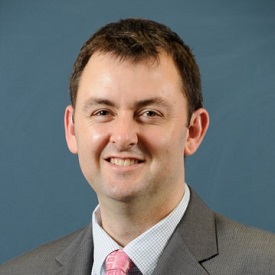A/Prof Matthew Hopcraft talks about our 'dental health crisis' with ABC Radio National
For Dental Health Week (5-11 August), Associate Professor Matthew Hopcraft from the Melbourne Dental School joined ABC Radio National's Life Matters for a special episode on dentistry.

A new Lancet study says we're in a "dental health crisis".
Tooth decay: The leading cause of preventable hospitalisation in Australian children
"If we look at what's happening in Australia: by the age of 5 to 6, one in three of our kids have tooth decay. It's the most common disease that's affecting our children and it's having a huge impact on them," said A/Prof Hopcraft. "We shouldn't be allowing kids to get to that age with tooth decay."
In 2015, the World Health Organization recommended limiting our sugar consumption to 6 teaspoons per day.
"Australian teenagers are consuming about 20 teaspoons a day. So you can see why we've got such a huge problem."
What is tooth decay?
The plaque and bugs in our mouths produce acid from the sugars that we eat.
"Normally, you brush your teeth, you keep the plaque levels down, you wash away some of that acid, and we don't have too many problems. But, if we eat too much sugar, if we eat sugar too frequently, if we don't brush our teeth and floss our teeth regularly, then that acid continues to attack the tooth until the tooth breaks down and a cavity forms. At the early stages, we can prevent it, we can reverse it, but when it gets too extensive and a hole forms, then we have to fill the tooth. And if it gets much, much bigger than that, then sometimes we're looking at having to extract the tooth."
Young children are more susceptible to tooth decay because the enamel (the outer layer of the tooth) of baby teeth is much thinner than adult teeth.
Inequity in Australian dental care
The Australian Dental Association reports that 57 per cent of adults say they can't afford to go to the dentist.
A/Prof Hopcraft attributes this to issues with health care funding in Australia, "Affordability of care has always been raised as a problem."
"There's a lot of subsidy of medical care, there's a lot of subsidy of hospitals, but that doesn't really exist in dentistry. So, we have state-funded dental care systems that have extraordinarily long waiting lists here in Victoria – patients are waiting more than 20 months for basic dental care. We've spent a lot of our time calling on the state government to put more funding into their public dental services so that people can get care at a much quicker rate," he said.
"We need to support access to dental care in the same way as we have access to other sorts of health care."
'Putting the mouth back into the body': How can we refocus attention on dental health care?
"Part of that is a better understanding of the links between dental health and general health," said A/Prof Hopcraft. "There are strong links between gum disease and heart disease, or between gum disease and diabetes for example. So, we know now that it actually is really important to get good dental health because that improves our overall health, or even, just around having good teeth so that we can eat well from a nutrition point of view."
 Sugar: The new tobacco?
Sugar: The new tobacco?
Public health interventions around sugar should be taken seriously.
"What we're really aware of now is the terrible role that sugar is playing in our health, and we spend a lot of time advocating from a dental perspective but we also spend a lot of time working with other health groups," said A/Prof Hopcraft. "The amount of sugar we're consuming is leading to really, really terrible health problems across the board."
A/Prof Hopcraft stressed the urgent necessity of having a public education campaign and commercial determinants to our sugar addiction.
"How do we improve food labelling? How do we fix up the Health Star Rating system? How do we stop junk food advertising? How do we stop this insidious marketing of sugary products to children?"
Responding to these questions will be key to fixing this health crisis.
"It's about: how do we actually get the public health experts and the people who are dealing with the consequences of disease to be heard, and not the industry – whose main role is to sell products –, involved in some of these decisions."
-
 Associate Professor Matthew Hopcraft is also the founder of advocacy group Sugar-free Smiles and the Chief Executive Officer for the Australian Dental Association (Victorian branch)
Associate Professor Matthew Hopcraft is also the founder of advocacy group Sugar-free Smiles and the Chief Executive Officer for the Australian Dental Association (Victorian branch)
This episode was presented by Hilary Harper, featuring A/Prof Matthew Hopcraft and Dr Mikaela Chinotti. Original air date: Monday 05 August 2019. Listen to the full episode here.